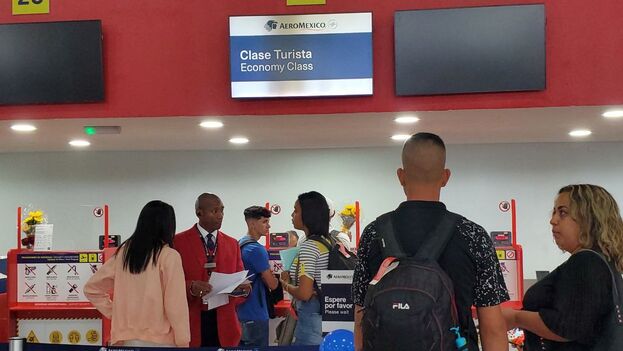
![]() 14ymedio, Mexico, 9 March 2023 — “Passengers who do not have a passport, stay seated.” That phrase, which on any other flight would sound strange, is already routine for the Aeroméxico flights between Havana and Mexico City that end in Managua. Cubans continue to use that route to get to the United States.
14ymedio, Mexico, 9 March 2023 — “Passengers who do not have a passport, stay seated.” That phrase, which on any other flight would sound strange, is already routine for the Aeroméxico flights between Havana and Mexico City that end in Managua. Cubans continue to use that route to get to the United States.
Between hugs and tears, Dayuris and Julio said goodbye to their families this Wednesday before heading to the migration check-in area of terminal 3 of José Martí International Airport. After passing the controls and approaching gate 13, where in a couple of hours the boarding for Aeromexico flight AM 052 would begin, the couple felt that they had completed “half the journey.”
“My sister filled out all the forms to obtain humanitarian parole in the United States, but it is delayed and we prefer to wait for the response in Mexico,” Dayuris says. “We have a cousin in Monterrey who has offered us his house, and maybe we can also regularize ourselves to work while we wait for the papers to go to Miami.”
After the entry into force last January of a new program that offers up to 30,000 monthly permits for Cuban, Nicaraguan, Haitian and Venezuelan citizens to enter the United States, the number of travelers from Cuba who take the so-called “volcano route” through Managua has decreased significantly.
However, there are still people interested in leaving the Island who take advantage of the flexibility that Daniel Ortega’s regime offers to Cubans, who don’t need a visa to visit Nicaragua. Some don’t want to continue waiting in Cuba, and others fear that something will happen to complicate their departure. The truth is that “tickets are still being sold as Havana-Mexico City-Managua,” an airline employee acknowledges to this newspaper.
Unlike a few months ago, when most of the travelers who boarded the Aeromexico flight were going to Nicaragua with a stopover in Mexico City, now Cuban migrants on the flight are intermingled with Russian, Canadian and European tourists who, after a stay on the Island, are heading north.
The difference between these passengers is that while foreign tourists disembark at Benito Juárez Airport, Cuban migrants must remain inside the plane until it takes off again, this time for Managua. They also have to hand over their passports at the time of boarding the flight, a measure that has been in force since last October 30, when Aeromexico resumed its flights to Havana.
Then, Aereomexico’s representatives reported that it was essential for travelers with a final destination in Managua to buy the round-trip ticket without connecting to other airlines, since they would be allowed to transfer to an aircraft other than their company’s at the Mexico City airport. Almost five months later, the mechanism remains intact.
Dayuris and Julio’s travel document was removed by airline employees before getting on the plane. “We are calling passengers to the final destination Mexico City for boarding. Passengers who don’t have a visa must wait to be called,” an airline employee repeated several times in the boarding hall of the Havana airport. A dozen people stayed apart until the rest of the passengers got on the plane.
“Then they took away our passports and gave us a number to recover them in Managua,” says Julio. In the Nicaraguan capital, a “guide” awaits them who will take them to a modest hotel, and the day after their arrival they have “arranged a transport” that will take them to the border with Honduras. “If everything goes well, next week we will be with our cousin in Monterrey,” he speculates. “The idea is to leave; once outside we’ll see.”
On the same flight as the couple, there was also a retired teacher with two sons in Miami who want her to “get as close as possible to the border” south of the United States; a father with his son who “in July is old enough to enter military service and must be taken out of Cuba as soon as possible,” and two sisters from Güira de Melena in Artemisa who claim to “have a contract to dance” in Ciudad Juárez until they gather the money to get to Houston, where an aunt lives.
Each one paid a figure close to $2,000 for the round trip, a return ticket that everyone hopes they won’t have to use. With a tiny package of salted peanuts, all the food distributed by the airline employees on the way between Havana and Managua, they embark on a migratory journey that provides more doubts than certainties.
Translated by Regina Anavy
____________
COLLABORATE WITH OUR WORK: The 14ymedio team is committed to practicing serious journalism that reflects Cuba’s reality in all its depth. Thank you for joining us on this long journey. We invite you to continue supporting us by becoming a member of 14ymedio now. Together we can continue transforming journalism in Cuba.
